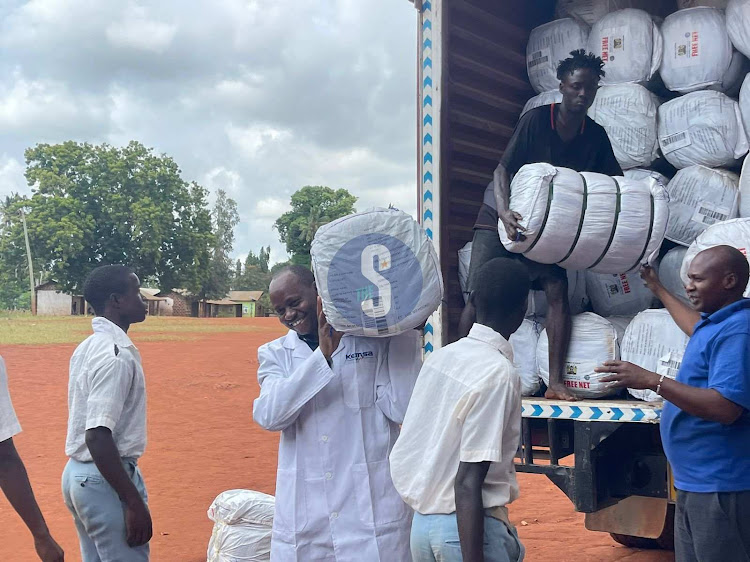Kilifi receives 1 million free mosquito nets in Kemsa initiative
The last-mile distribution of mosquito nets started in January 2024. In Summary The Kenya Medical Supplies Authority (KEMSA) CEO Andrew Mulwa and Kilifi Governor Gideon Mung’aro flagged off 1,054,000 treated mosquito nets for distribution in the seven Kilifi sub-counties. Mung'aro acknowledged the initiative, thanking KEMSA for the last-mile distribution initiative.

Kilifi County on Tuesday started the distribution of over one million mosquito nets under the National Malaria Control Program (NMCP)
The program is funded by the Global Fund. It aims to distribute treated nets to all 22 counties prone to malaria.
Kenya Medical Supplies Authority (KEMSA) CEO Andrew Mulwa and Kilifi Governor Gideon Mung’aro flagged off 1,054,000 treated mosquito nets for distribution in the seven Kilifi sub-counties.
According to KEMSA, Kilifi County has 679 posts.
It is classified as one of the malaria endemic areas that need mosquito nets for the prevention of malaria.
Mung'aro acknowledged the initiative, thanking KEMSA for the last-mile distribution initiative.
"It makes it easier for us to hand the nets over to the communities," Mung'aro said.
The program aims to distribute 10.9 million nets across 22 counties to mitigate the impact of malaria.
According to KEMSA, the last-mile distribution of mosquito nets started in January 2024.
So far, the authority has completed distribution in 10 counties.
These include Kisii, Nyamira, Kisumu, Siaya, Migori, Tana River, Lamu, Taita Taveta, Kwale and Mombasa counties.
Currently, distribution is ongoing in Kilifi and Busia counties.
The remaining counties are Turkana, West Pokot, Narok, Trans Nzoia, Baringo and Kirinyaga counties.
During distribution, KEMSA faces challenges including flooding, poor terrain, accessibility to some distribution posts due to poor road network (narrow roads) and insecurity.
Speaking after receiving the nets, Zulfe Nyanzua Yawa, a village elder, thanked the government for the distribution initiative.
She said they will educate the locals on how to use them, urging KEMSA to distribute the nets every year.
"We would like them to come and distribute again in one year. Right now, malaria is our biggest problem. Because of the lack of nets, our children, below five years are the most affected," she said.
Yawa said they last received nets some five years ago, promising that they will help distribute them from one house to another and also during Barazas.
She added that sometimes the locals lack medicines in the local hospitals.
"During the rainy season, like April, when the grass grows, malaria cases are very high because of mosquitoes. We suffer a lot," she said.
KEMSA CEO Andrew Mulwa distributing nets to locals at Bundacho village in Kilifi County on July 9, 2024
Another local, NyaleMwakuni, thanked KEMSA, the government and the Global Fund at large for the reception of mosquito nets.
He decried their plight due to malaria, which he termed as “our main disease”.
“Malaria has troubled us so much, I have eight kids. Currently, I don't have any nets. I had been given others like two years ago. I'm urging the government after every two years, you come again,” Mwakuni said.
KEMSA distribution manager Isaac Mwele explained the process of reception and distribution of the nets.
The nets were dropped off at five distribution points including Malava Sub County Hospital (four containers), MutodiaGodowns(12 containers), Makio Social Health Centre and Mombasa deport.
He explained that each drop-off point has a specific number of nets and then household registration is done by the National Malaria Control Programme.
Following this, the total number of distribution posts is done for the last-mile distribution initiative.
Kaloleni Sub County malaria control coordinator PurityKatama, said there have been fewer cases since they started receiving nets every three years.
There have however been areas reporting high malaria cases like Kaloleni ward and MwanaMwimba.
Bales of free mosquito nets at KEMSA warehouse in Mombasa in July 10, 2024. The nets are being distributed by KEMSA through a program supported by Global Fund under the National Malaria Control Program (NMCP).
She said they have had cases of severe malaria including a child with cerebral malaria.
Katama said the nets will help reduce malaria, saying during sensitisation programs, they get reports that some families lack nets while others are not in the right condition.
"This exercise will help reduce malaria. When we look back, we can attest that cases have reduced since the distribution initiative began," she said.
Additionally, Kaloleni Sub County manager for health Peter Mwangome said the prevalence of malaria in the area is more than five per cent.
He added that they are working towards preventing malaria in the hotspot areas, including covering 36,213 households.
"There is a very big importance in terms of usage of treated nets. We have insisted community members sleep under these nets because when they do, we prevent malaria over 75 per cent," he said.
Mwangome said they have done social behaviour change to understand why they have the nets and how to use them for the intended purpose.
"They have agreed to use the nets. Now they are asking where are the nets. We are ready and mwananchi is ready to receive the nets," he said.
The Kenya malaria indicator survey report indicates that about four million Kenyans contract malaria disease, while more than 10,000 people die of the disease annually.
Bales of free mosquito nets at KEMSA warehouse in Mombasa in July 10, 2024. The nets are being distributed by KEMSA through a program supported by Global Fund under the National Malaria Control Program (NMCP).
CEO Andrew Mulwa distributing nets to locals at Bundacho village in Kilifi County on July 9, 2024